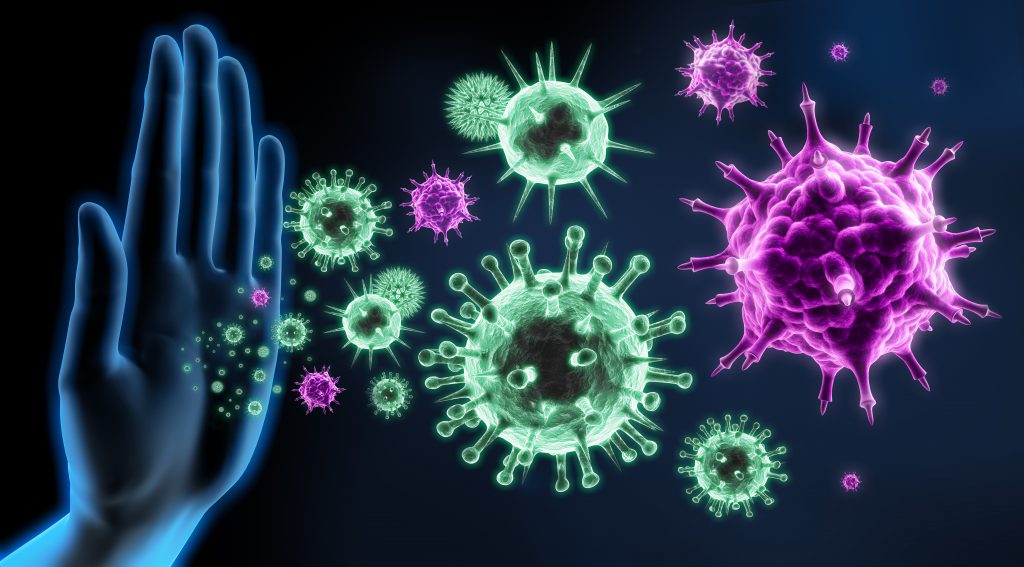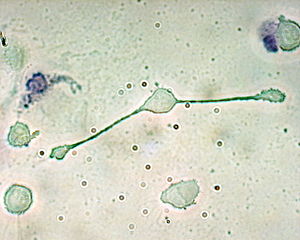Active substances for immune activation
Dr. med. Heinz Lüscher
Our immune system is an impressive and highly complex miracle of creation. It can fight pathogens, but also recognizes and eliminates pathologically altered cells in the body. The immune system includes a whole series of specialized cells, e.g. macrophages. They can “eat” pathogens, foreign bodies and diseased cells and eliminate them (phagocytosis). Normally, only a few macrophages are activated in our body. The large remainder is only alerted in the event of a crisis. This happens through a special substance, the vitamin D-binding protein, which interacts with B and T cells from the specific immune system. In the process, a special messenger substance is released, which activates the macrophages and thus decisively supports our immune system. The macrophage-activating messenger can also be taken in the form of special food supplements.
The Immune System
Our immune system is a wonder of nature, a miracle in fact. It can distinguish between foreign objects and the body’s own. It can fight bacteria, viruses, fungi and parasites that would otherwise cause life-threatening infections. Without the immune system we would be constantly ill and unable to survive. However, the immune system also recognises pathologically altered endogenous cells and eliminates them. It can therefore be viewed as a part of the cleaning team which functions like the body’s garbage collection.
The immune system is as individual as a person’s fingerprint. There are even indications that its composition influences the scent of the body and thus plays a role in the search for a partner. Those who “cannot stand the smell” of somebody, do not fit together immunologically.
Non-specific and specific immune defence
The human immune system consists of several organs, tissues, cells and messenger substances. Basically, two systems are distinguished: The non-specific immune defence which is the first line of defence. It is always ready for action and opposes everything that is recognized as “foreign to the body”. It is also known as the innate immune system we are born with.

The specific or acquired immune defence system must first learn what needs to be combated, and as it learns it is becomes more effective. It only develops after contact with a specific pathogen. Specialised cells of this second line of defence produce highly specific antibodies that match this pathogen like the key to the lock. These antibodies attach themselves to the pathogen and identify it. Now the scavenger cells recognize it as dangerous and eliminate it. The trick is that memory cells store the information on these antibodies. If it comes into contact with this pathogen again, the immune system can now produce the required antibodies very quickly, resulting in a rapid and targeted defence reaction. This is the reason, for example, why we only get some childhood diseases once in a lifetime. The first time we become really ill, because the immune system needs time to produce the necessary antibodies. With each further contact, this information is quickly available and the pathogen is effectively combated before we fall ill a second time.
Immune system good, (almost) everything good
Basically, our immune system is capable of recognizing almost every disease and coping with it by itself. However, there are pathogens that are so numerous and have such severe consequences that a person can die before his or her immune system gains the upper hand. This applies, for example, to plagues, like Ebola and other serious viral or bacterial infections. In other cases, the immune system does not recognize degenerated cells of the body or does not recognize them well enough. Then it comes to cancer. The reverse is just as malicious: the immune system is misdirected and begins to fight against healthy, endogenous structures. This leads to autoimmune diseases. In the case of allergies, on the other hand, the immune system reacts excessively to what are actually harmless substances from outside (pollen, food, insect bites, etc.). Pathogens that attack the immune system and thus weaken it are also nasty. These include, for example, the HIV pathogen that leads to AIDS.
Yet, it is important to note that our immune system is the best and most effective weapon for fighting diseases and staying healthy. Many of our medical activities ultimately aim to strengthen the immune system and support the body’s own defence system. A healthy and powerful immune system results directly in a healthy and resistant organism. If we can strengthen and activate the immune system, we have already achieved a great deal.
NK-cells and Macrophages
The immune system includes a whole series of specialized cells. Two of these are the natural killer cells and the macrophages. Natural killer cells, or NK cells for short, belong to the innate immune system, but also play an important role in the specific immune defence. They are mainly directed against virus-infected cells or the onset of tumour formation. NK cells are the first to recognise affected and stressed cells. Once they have discovered a diseased cell, the NK cells release special proteins that perforate the cell membrane of the diseased cell and eventually lead to the cell’s death (apoptosis).
Macrophages are the largest cells in our immune system. They can “eat” and eliminate pathogens, foreign bodies and diseased cells (phagocytosis). They also present fragments of the pathogens to specialised B- and T-lymphocytes so that these cells, which also belong to the immune system, can develop the appropriate antibodies. Normally only a few macrophages are activated in our body. The rest will only be alerted in the event of a crisis. This is done by a special protein that binds vitamin D (vitamin D-binding protein) and interacts with B and T cells from the specific immune system. A special messenger substance is released, which activates the macrophages and increases their activity by a factor of 30.

Our body is wonderfully equipped to fight pathogens. Yet, viruses and cancer cells are not idle either. Sometimes these virus and cancer cells are able to use special enzymes to prevent the conversion of the vitamin D-binding protein into the special activation factor. This can significantly weaken our immune system.
Macrophage-activating messenger
This special messenger substance, which activates the macrophages and thus decisively supports our immune system, is contained in certain food combinations. It can also be taken in the form of a food supplement. The following effects then become apparent after taking the food supplement:
- Support of the immune system
In addition to the activation of macrophages, a significantly higher number of immune cells were found in the blood within 7 days of treatment. The number of Dendritic cells, T-helper cells, cytotoxic T-cells and NK-cells also increased. - cardiovascular support
A clinical study showed an increase in nitric oxide, which is toxic in high doses but evaporates in small doses from the inner wall of the blood vessels and regulates vascular diameter, blood pressure and blood clotting. - Anti-inflammatory effect
In mice it was observed after 24 hours that the inflammation-promoting cytokine TNF-alpha also decreased by up to 55% as well as inflammatory interleukins. - Anti-cancer activity
The observation of various human and mouse cancer cells (in vitro = test outside a living organism) showed a clear trend towards the reduction of 2 oncogenes, the increase of 3 tumour suppressor genes and the destruction of tumour cells after 24 hours. - Neuro-protective and neuro-regenerative activity
The observation of human neurons and glial cells (again in vitro) showed an accelerated formation of new neurons and new synaptic compounds after 24 hours.
Suitable products
A highly specialized product containing the activating messenger substance is supplemented with selected strains of lactic acid bacteria (probiotics), vitamin D3 as well as colostrum (colostrum), which work together optimally and additionally support the immune system. Pay attention to gastric juice-resistant capsules, only then the absorption and effect in the body is best possible. There are larger capsules with 400 mg content and small ones with 100 mg. The smaller ones are intended for daily use, the larger ones are taken 1-3 times a week, as needed.
Selected studies
- Nagasawa H et al. (2005): Gc Protein (Vitamin D-binding Protein): Gc Genotyping and GcMAF Precursor Activity. Anticancer Res. 2005 Nov-Dec;25(6A):3689-95. Review. PubMed [citation] PMID: 16302727
- Chaiyasit K, Toshio I, Wiwanitkit V (2015): The use of Gc protein-derived macrophage activating factor for management of thyroid cancer. J Cancer Res Ther. 2015 Oct-Dec;11(4):1041. doi: 10.4103/0973-1482.151448. PubMed [citation] PMID: 26881663
- Thyer L et al. (2013): GC protein-derived macrophage-activating factor decreases α-N-acetylgalactosaminidase levels in advanced cancer patients. Oncoimmunology. 2013 Aug 1;2(8):e25769. Epub 2013 Jul 29. PubMed [citation] PMID: 24179708, PMCID: PMC3812199
- Thyer L et al. (2013): A novel role for a major component of the vitamin D axis: vitamin D binding protein-derived macrophage activating factor induces human breast cancer cell apoptosis through stimulation of macrophages. Nutrients. 2013 Jul 8;5(7):2577-89. doi: 10.3390/nu5072577. PubMed [citation] PMID: 23857228, PMCID: PMC3738989
- Kuchiike D et al. (2013): Degalactosylated/desialylated human serum containing GcMAF induces macrophage phagocytic activity and in vivo antitumor activity. Anticancer Res. 2013 Jul;33(7):2881-5. PubMed [citation] PMID: 23780974
- Pacini S et al. (2012): Effects of vitamin D-binding protein-derived macrophage-activating factor on human breast cancer cells. Anticancer Res. 2012 Jan;32(1):45-52. PubMed [citation] PMID: 22213287
- Gregory KJ et al. (2010): Vitamin D binding protein-macrophage activating factor directly inhibits proliferation, migration, and uPAR expression of prostate cancer cells. PLoS One. 2010 Oct 18;5(10):e13428. doi: 10.1371/journal.pone.0013428. PubMed [citation] PMID: 20976141, PMCID: PMC2956649
- Siniscalco D et al. (2014): The in vitro GcMAF effects on endocannabinoid system transcriptionomics, receptor formation, and cell activity of autism-derived macrophages. J Neuroinflammation. 2014 Apr 17;11:78. doi: 10.1186/1742-2094-11-78. PubMed [citation] PMID: 24739187, PMCID: PMC3996516
- Inui T et al. (2016): Case Report: GcMAF Treatment in a Patient with Multiple Sclerosis. Anticancer Res. 2016 Jul;36(7):3771-4. PubMed [citation] PMID: 27354653
- Inui T et al. (2015): Oral Colostrum Macrophage-activating Factor for Serious Infection and Chronic Fatigue Syndrome: Three Case Reports. Anticancer Res. 2015 Aug;35(8):4545-9. PubMed [citation] PMID: 26168499
